TEDAngela Lee通往成功的秘诀--耐力 演讲稿
AngelaLeeDuckworth(李惠安)TED演讲《成功的要诀是什么?》英文原文

AngelaLeeDuckworth(李惠安)TED演讲《成功的要诀是什么?》英⽂原⽂⼏个⽉前在新浪微博上看到的⼀个讲关于“成功的要诀”的TED(Technology, Entertainment,Design)(Ideas Worth Spreading)视频,是由美籍华裔Angela Lee Duckworth(李惠安)演讲,视频不到6分钟,且⼜只有中⽂字幕,⾮常适合⽤来做听⼒练习。
我先把维基百科上有关演讲者的介绍摘抄过来:安杰拉·李·达克沃斯(英语:Angela Lee Duckworth,1970年-),汉名李惠安,⽣于美国,⼼理学者,现任教于宾州⼤学⼼理学系。
其母亲为台湾⼈,毕业于国⽴师范⼤学,移民美国。
达克沃斯于1992年于哈佛⼤学取得神经⽣物学⽂学⼠。
取得马歇尔奖学⾦,进⼊⽜津⼤学,攻读神经科学,1996年获理学硕⼠。
在毕业后,先进⼊麦肯锡公司⼯作,后转⾄公⽴学校,担任数学教师。
32岁时决定往学术界发展,2006年于宾州⼤学取得⼼理学博⼠。
2013年获得麦克阿瑟奖。
演讲视频:Grit: The Power of Passion and Perseverance听写英⽂原⽂:When I was 27 years old, I left a very demanding job in management consulting for a job thatwas even more demanding - teaching. I went to teach 7 graders math in the New York CityPublic Schools. And like any teacher, I made quizzes and tests and gave out homeworkassignments. When their work came back, I calculated grades. What's struck me was that IQwas not the only difference between my best and my worst students.Some of my strongest performancers did not have stratosphere of IQ scores. Some of mysmartest kids were doing so off?? And that got me thinking. Kinds of things you need to learn in7-grade math, sure they're hard. Ratios, decimals, the area of parallelogram. But theseconcepts are not impossible. And I was firmly convinced that everyone of my students couldlearn the material if they work hard long enough. After several more years of teaching, I came tothe conclusion that what we need in eduction is much better understanding of students andlearning from motivational perspective, from psychological perspective.In education, the one thing we know how to measure best is IQ. But what if doing well at schooland life depends on much more their own ability to learn quickly and easily. So I left classroomand went to graduate school to become a psychologist. I started studying kids and adults in allkinds of super challenge settings. And in every study my question was who is successful hereand why? My research team and I went to West Point Military Academy. We tried to predictwhich candidates would stay in military training and which would drop out. We went to theNational Spelling Bee and tried to predict which children would advance far in this competition.We studied rookie teachers working in really tough neighborhoods, asking which teachers arestill gonna be here in teaching by the end of school year. And of those, who'd be the mosteffective at improving learning outcomes for the students. We partnered with private companiesasking which of these sales people are gonna keep their jobs and who's gonna earn the mostmoney.In all those very different contexts, one characteristic emerged as significant predictor ofsuccess. And it wasn't socal talents, wasn't good looks, physical health, and wasn't IQ. It wasgrit. Grit is passion and perseverance for very long term goals. Grit is having stamina. Grit issticking with your future. Day in day out, not just for the week, not just for the month, but foryears. And working really hard to make that future a reality. Grit is living a life like it's amarathon, not a sprint.A few years ago, I started studying grit in Chicago public schools. I asked thousands of highschool juniors to take grit questionaires and then waited around more than a year to see whowould graduate. It turns out that the grittier kids were significantly more likely to graduate. Evenwhen I matched them on every characteristic I could measure, things like family income, standardized achievement test scores, even how safe kids feel when they were in school. So that's not just West Point and National Spelling Bee that grit matters, it's also in school, especially for kids at risk of dropping out.To me, the most shocking thing about grit is how little we know, how little science knows about building it, everyday parents and teachers ask me how do I build gritty kids, what I do to teach kids solid work ethic, how to keep them motivated for the long run? The honest answer is 'I don't know'. What I do know is that talent doesn't make you gritty.Our data show very clearly that there are many talented individuals who simply do not follow through on their commitments. In fact, our data, grit is usually unrelated or even in reversely related to measures of talent.So far, the best idea I've heard about building gritty kids is something called 'growth mindset'. This is an idea developed in Stanford University by Carol Dweck. And it is the belief that the ability to learn is not fixed, that it can change with your effort. Dr. Dweck showed when kids read and learn about the brain and how it changes and grows in response to challenge.They're much more likely to persevere when they fail because they don't believe that the failure is a permanent condition. So growth mindset is a great idea for building grit. But we need more, and that's why I'm gonna end my remarks because that's where we are. That's the world that stands before us. We need to take our best ideas, our strongest intuitions and we need to test them. We need to measure whether we've been successful and we have to be willing to fail, to be wrong, to start over again with lessons learned. In another words, we need to be gritty about getting our kids grittier. Thank you.(加粗的地⽅是我反复听才听出来的;加粗打问号的地⽅是不确定是否听写正确的,如果有⾼⼿知道,请留⾔,感谢)不做过多讲解,⼤家有空也可练习⼀下,喜欢美式发⾳的同学甚⾄还可背诵下来。
AngelaLeeDuckworth在Ted英语演讲:成功的钥匙?毅力(中英双语)
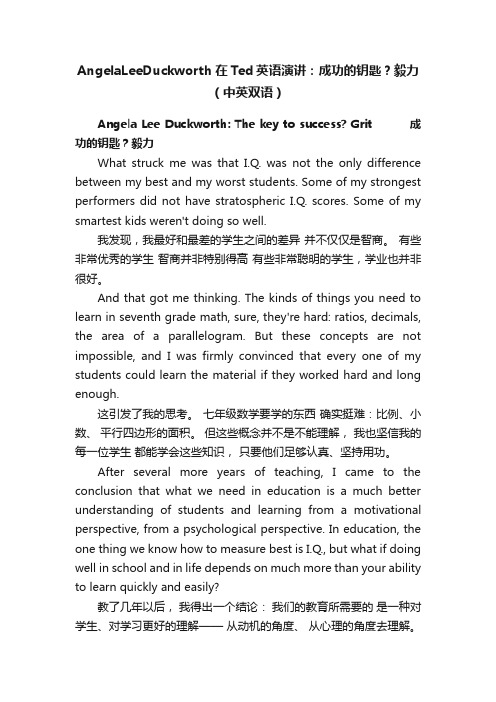
AngelaLeeDuckworth在Ted英语演讲:成功的钥匙?毅力(中英双语)Angela Lee Duckworth: The key to success? Grit 成功的钥匙?毅力What struck me was that I.Q. was not the only difference between my best and my worst students. Some of my strongest performers did not have stratospheric I.Q. scores. Some of my smartest kids weren't doing so well.我发现,我最好和最差的学生之间的差异并不仅仅是智商。
有些非常优秀的学生智商并非特别得高有些非常聪明的学生,学业也并非很好。
And that got me thinking. The kinds of things you need to learn in seventh grade math, sure, they're hard: ratios, decimals, the area of a parallelogram. But these concepts are not impossible, and I was firmly convinced that every one of my students could learn the material if they worked hard and long enough.这引发了我的思考。
七年级数学要学的东西确实挺难:比例、小数、平行四边形的面积。
但这些概念并不是不能理解,我也坚信我的每一位学生都能学会这些知识,只要他们足够认真、坚持用功。
After several more years of teaching, I came to the conclusion that what we need in education is a much better understanding of students and learning from a motivational perspective, from a psychological perspective. In education, the one thing we know how to measure best is I.Q., but what if doing well in school and in life depends on much more than your ability to learn quickly and easily?教了几年以后,我得出一个结论:我们的教育所需要的是一种对学生、对学习更好的理解——从动机的角度、从心理的角度去理解。
TED演讲:成功的关键不是智商,而是毅力
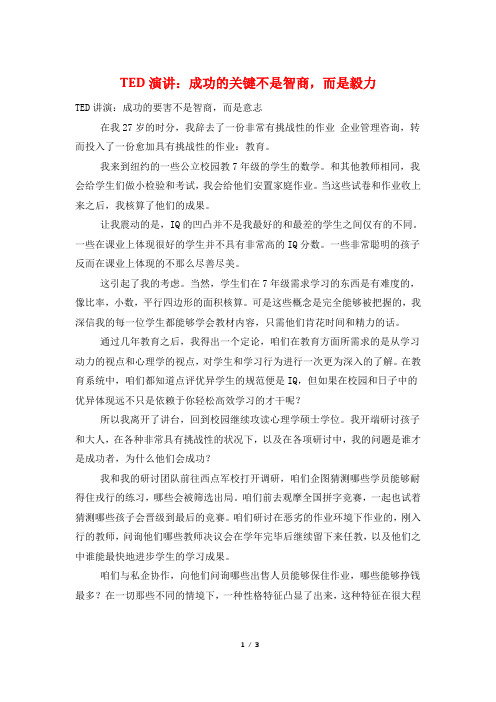
TED演讲:成功的关键不是智商,而是毅力TED讲演:成功的要害不是智商,而是意志在我27岁的时分,我辞去了一份非常有挑战性的作业企业管理咨询,转而投入了一份愈加具有挑战性的作业:教育。
我来到纽约的一些公立校园教7年级的学生的数学。
和其他教师相同,我会给学生们做小检验和考试,我会给他们安置家庭作业。
当这些试卷和作业收上来之后,我核算了他们的成果。
让我震动的是,IQ的凹凸并不是我最好的和最差的学生之间仅有的不同。
一些在课业上体现很好的学生并不具有非常高的IQ分数。
一些非常聪明的孩子反而在课业上体现的不那么尽善尽美。
这引起了我的考虑。
当然,学生们在7年级需求学习的东西是有难度的,像比率,小数,平行四边形的面积核算。
可是这些概念是完全能够被把握的,我深信我的每一位学生都能够学会教材内容,只需他们肯花时间和精力的话。
通过几年教育之后,我得出一个定论,咱们在教育方面所需求的是从学习动力的视点和心理学的视点,对学生和学习行为进行一次更为深入的了解。
在教育系统中,咱们都知道点评优异学生的规范便是IQ,但如果在校园和日子中的优异体现远不只是依赖于你轻松高效学习的才干呢?所以我离开了讲台,回到校园继续攻读心理学硕士学位。
我开端研讨孩子和大人,在各种非常具有挑战性的状况下,以及在各项研讨中,我的问题是谁才是成功者,为什么他们会成功?我和我的研讨团队前往西点军校打开调研,咱们企图猜测哪些学员能够耐得住戎行的练习,哪些会被筛选出局。
咱们前去观摩全国拼字竞赛,一起也试着猜测哪些孩子会晋级到最后的竞赛。
咱们研讨在恶劣的作业环境下作业的,刚入行的教师,问询他们哪些教师决议会在学年完毕后继续留下来任教,以及他们之中谁能最快地进步学生的学习成果。
咱们与私企协作,向他们问询哪些出售人员能够保住作业,哪些能够挣钱最多?在一切那些不同的情境下,一种性格特征凸显了出来,这种特征在很大程度上预示了成功。
并且它并不是交际智力。
不是美丽的表面,健旺的体魄,也不是很高的IQ,它是坚毅。
坚持是成功的钥匙作文 ted成功的钥匙毅力(共5页)
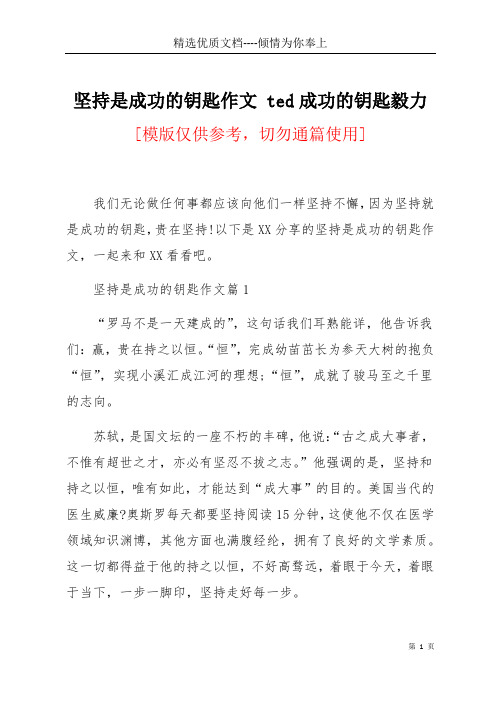
坚持是成功的钥匙作文 ted成功的钥匙毅力[模版仅供参考,切勿通篇使用]我们无论做任何事都应该向他们一样坚持不懈,因为坚持就是成功的钥匙,贵在坚持!以下是XX分享的坚持是成功的钥匙作文,一起来和XX看看吧。
坚持是成功的钥匙作文篇1“罗马不是一天建成的”,这句话我们耳熟能详,他告诉我们:赢,贵在持之以恒。
“恒”,完成幼苗茁长为参天大树的抱负“恒”,实现小溪汇成江河的理想;“恒”,成就了骏马至之千里的志向。
苏轼,是国文坛的一座不朽的丰碑,他说:“古之成大事者,不惟有超世之才,亦必有坚忍不拔之志。
”他强调的是,坚持和持之以恒,唯有如此,才能达到“成大事”的目的。
美国当代的医生威廉?奥斯罗每天都要坚持阅读15分钟,这使他不仅在医学领域知识渊博,其他方面也满腹经纶,拥有了良好的文学素质。
这一切都得益于他的持之以恒,不好高骛远,着眼于今天,着眼于当下,一步一脚印,坚持走好每一步。
丘吉尔在一次演讲中说:“我成功的秘诀有三个:第一是决不放弃;第二是,决不,决不放弃;第三是,决不,决不,决不能放弃!我的演讲结束了。
”丘吉尔成功的秘诀就在于此,在于他的不肯放弃。
在我们现在的生活中,我想,没有人会遭遇到比丘吉尔更大更多的困难,在这些困难面前,我们不能畏惧,唯有选择迎难而上,把困难作为一种不断鞭策自己促使自己前进鞭子,要知道,把希望放在所谓的奇迹上,日复一日地等待奇迹出现,实不可取。
曾有人说过:“绝望谓之虚妄,正与希望相同。
”没有脚踏实地的坚持,没有一点一滴的积累,想用一个个不切实际的希望来支撑一个有价值的人生,我只能说那是痴人说梦。
毛泽东说过:“苟有恒,何必三更眠五更起;最无益,只怕一日曝十日寒。
”它被无数莘莘学子写在案板床头,恨不得每日吟诵十遍。
然而坚持,不仅是一种意识,更是一种行动,它体现在我们的日常学习中,每天多弄懂一道题,多背过一个知识点,积少成多,你最终会发现自己的进步。
苹果总裁乔布斯说;“大家一定要坚持这样的信念,在命运、人生、学业、事业等各个方面都要坚持。
成功的秘诀演讲稿
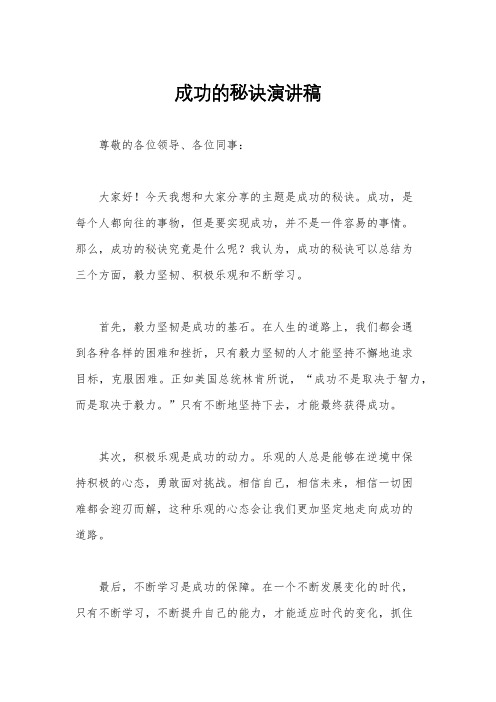
成功的秘诀演讲稿
尊敬的各位领导、各位同事:
大家好!今天我想和大家分享的主题是成功的秘诀。
成功,是
每个人都向往的事物,但是要实现成功,并不是一件容易的事情。
那么,成功的秘诀究竟是什么呢?我认为,成功的秘诀可以总结为
三个方面,毅力坚韧、积极乐观和不断学习。
首先,毅力坚韧是成功的基石。
在人生的道路上,我们都会遇
到各种各样的困难和挫折,只有毅力坚韧的人才能坚持不懈地追求
目标,克服困难。
正如美国总统林肯所说,“成功不是取决于智力,而是取决于毅力。
”只有不断地坚持下去,才能最终获得成功。
其次,积极乐观是成功的动力。
乐观的人总是能够在逆境中保
持积极的心态,勇敢面对挑战。
相信自己,相信未来,相信一切困
难都会迎刃而解,这种乐观的心态会让我们更加坚定地走向成功的
道路。
最后,不断学习是成功的保障。
在一个不断发展变化的时代,
只有不断学习,不断提升自己的能力,才能适应时代的变化,抓住
机遇,实现自己的价值。
正如古希腊哲学家苏格拉底所说,“我知道我一无所知”,只有保持谦卑的学习态度,才能不断提高自己,走向成功。
在实现成功的道路上,毅力、乐观和学习是我们必须具备的品质。
只有不断地坚持,积极面对一切困难,不断学习,我们才能最终实现自己的成功。
让我们一起努力,共同追求成功的梦想!
谢谢大家!。
成功的秘诀:坚持不懈与智慧并行英文演讲稿范文
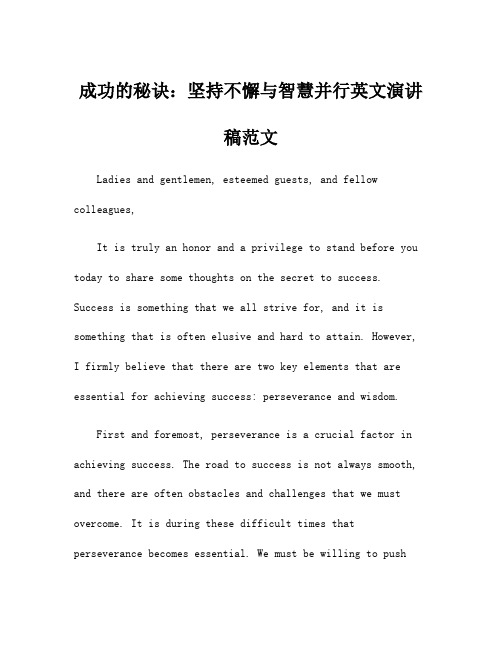
成功的秘诀:坚持不懈与智慧并行英文演讲稿范文Ladies and gentlemen, esteemed guests, and fellow colleagues,It is truly an honor and a privilege to stand before you today to share some thoughts on the secret to success. Success is something that we all strive for, and it is something that is often elusive and hard to attain. However, I firmly believe that there are two key elements that are essential for achieving success: perseverance and wisdom.First and foremost, perseverance is a crucial factor in achieving success. The road to success is not always smooth, and there are often obstacles and challenges that we must overcome. It is during these difficult times that perseverance becomes essential. We must be willing to pushthrough the tough times, to keep going even when the going gets tough. It is the ability to continue on, despite adversity, that separates the successful from the unsuccessful. As the saying goes, "When the going gets tough, the tough get going."On the other hand, wisdom is also a critical component of success. It is not enough to simply work hard and push through challenges. We must also be smart about the decisions that we make and the actions that we take. Wisdom allows us to make informed choices, to learn from our mistakes, and to make the best use of our resources. It is the combination of perseverance and wisdom that allows us to navigate the ups and downs of life and to ultimately achieve our goals.So, in conclusion, I believe that the secret to success lies in the combination of perseverance and wisdom. It is not enough to simply work hard, nor is it enough to simply be smart. We must have both qualities in order to truly achievesuccess. And so, I urge each and every one of you to persevere in the face of challenges, to be wise in your decision making, and to keep pushing forward towards your goals. With perseverance and wisdom, I am confident that success will be within your reach.Thank you.。
TEDAngelaLee通往成功的秘诀--耐力演讲稿

TEDAngelaLee通往成功的秘诀--耐力演讲稿WhenIwas27yearsold,Ileftaverydemandingjobinmanagementconsultingforajobt hatwasevenmoredemanding:teaching.IwenttoteachseventhgradersmathsintheNewYorkCity public schools. And like any teacher, I made quizzes and tests. Igaveouthomeworkassignments.Whentheworkcameback,Icalculatedgrades.Whatstru ckmewasthatIQwasnottheonlydifferencebetweenmybestandmyworstudents.Someof mystrongest performers did not have stratospheric IQ scores. Some ofmy smartest kids weren't doing so well and that got me thinking. Thekinds of things you need to learn in seventh grade maths, sure, theyarehard:Tome,themostshockingthingaboutgritishowlittleweknow, how little science knows, about building it. Everyday, parentsandteachersaskme:howdoIbuild gritinkids?whatdoIdoteach kids a solid work ethic? How do Ikeep them motivated for thelong run? The honest answer is:So far, the best idea I've heard about building grit in kids issomethingcalled"GrowthMindset".ThisanideadevelopedatStanfordUniversitybyCaro lDweck,anditisthebeliefthattheability to learn is not fixed, that it can change with your effort. Dr.Dweck has shown that when kids read and learn about the brain andhowitchangesandgrowsinresponsetochallenge,they'remuchmore likely to persevere when they fail, because they don't believethat failure is a permanent condition. So growth mindset is a greatidea for building grit. But we need more, and that's where I'm goingto end my remarks because that's where we are. That's the work thatstands before us.We need to take our best ideas, our strongest intuitions andweneedtotestthem.Weneedtomeasurewhetherwe'vebeensuccessfulandwehavet obewillingtofail,tobewrong,tostartover again with lessons learned. In other words, we need to be grittyabout getting our kids gritter. Thank you!1 / 1。
TED演讲:成功的关键不是智商,而是毅力
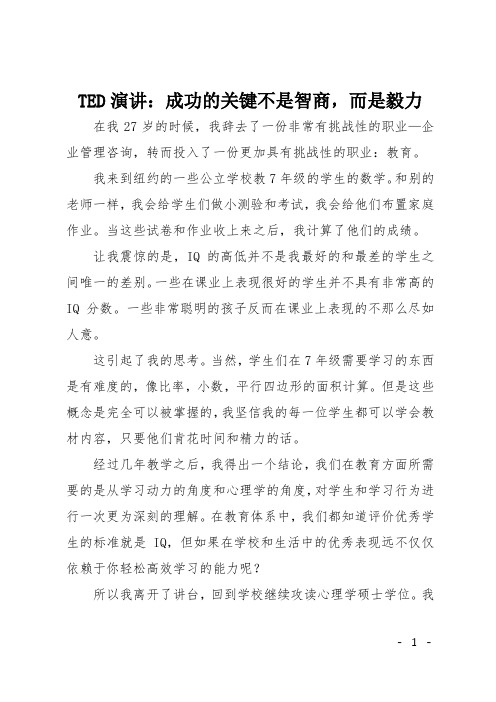
TED演讲:成功的关键不是智商,而是毅力在我27岁的时候,我辞去了一份非常有挑战性的职业—企业管理咨询,转而投入了一份更加具有挑战性的职业:教育。
我来到纽约的一些公立学校教7年级的学生的数学。
和别的老师一样,我会给学生们做小测验和考试,我会给他们布置家庭作业。
当这些试卷和作业收上来之后,我计算了他们的成绩。
让我震惊的是,IQ的高低并不是我最好的和最差的学生之间唯一的差别。
一些在课业上表现很好的学生并不具有非常高的IQ分数。
一些非常聪明的孩子反而在课业上表现的不那么尽如人意。
这引起了我的思考。
当然,学生们在7年级需要学习的东西是有难度的,像比率,小数,平行四边形的面积计算。
但是这些概念是完全可以被掌握的,我坚信我的每一位学生都可以学会教材内容,只要他们肯花时间和精力的话。
经过几年教学之后,我得出一个结论,我们在教育方面所需要的是从学习动力的角度和心理学的角度,对学生和学习行为进行一次更为深刻的理解。
在教育体系中,我们都知道评价优秀学生的标准就是IQ,但如果在学校和生活中的优秀表现远不仅仅依赖于你轻松高效学习的能力呢?所以我离开了讲台,回到学校继续攻读心理学硕士学位。
我开始研究孩子和大人,在各种非常具有挑战性的情况下,以及在各项研究中,我的问题是谁才是成功者,为什么他们会成功?我和我的研究团队前往西点军校展开调研,我们试图预测哪些学员能够耐得住军队的训练,哪些会被淘汰出局。
我们前去观摩全国拼字比赛,同时也试着预测哪些孩子会晋级到最后的比赛。
我们研究在恶劣的工作环境下工作的,刚入行的老师,询问他们哪些老师决定会在学年结束后继续留下来任教,以及他们之中谁能最快地提高学生的学习成绩。
我们与私企合作,向他们询问哪些销售人员可以保住工作,哪些可以赚钱最多?在所有那些不同的情境下,一种性格特征凸显了出来,这种特征在很大程度上预示了成功。
而且它并不是社交智力。
不是漂亮的外表,强健的体魄,也不是很高的IQ,它是坚毅。
- 1、下载文档前请自行甄别文档内容的完整性,平台不提供额外的编辑、内容补充、找答案等附加服务。
- 2、"仅部分预览"的文档,不可在线预览部分如存在完整性等问题,可反馈申请退款(可完整预览的文档不适用该条件!)。
- 3、如文档侵犯您的权益,请联系客服反馈,我们会尽快为您处理(人工客服工作时间:9:00-18:30)。
WhenIwas27yearsold,Ileftaverydemandingjobinmanagementconsultingforajobt hatwasevenmoredemanding:
teaching.IwenttoteachseventhgradersmathsintheNewYorkCity public schools. And like any teacher, I made quizzes and tests. Igaveouthomeworkassignments.Whentheworkcameback,Icalculatedgrades.Whatstru ckmewasthatIQwasnottheonlydifferencebetweenmybestandmyworstudents.Someof mystrongest performers did not have stratospheric IQ scores. Some ofmy smartest kids weren't doing so well and that got me thinking. Thekinds of things you need to learn in seventh grade maths, sure, theyarehard:
Tome,themostshockingthingaboutgritishowlittleweknow, how little science knows, about building it. Everyday, parentsandteachersaskme:
howdoIbuild gritinkids?whatdoIdoteach kids a solid work ethic? How do I keep them motivated for thelong run? The honest answer is:
So far, the best idea I've heard about building grit in kids issomethingcalled"GrowthMindset".ThisanideadevelopedatStanfordUniversitybyCaro lDweck,anditisthebeliefthattheability to learn is not fixed, that it can change with your effort. Dr.Dweck has shown that when kids read and learn about the brain andhowitchangesandgrowsinresponsetochallenge,they'remuchmore likely to persevere when they fail, because they don't believethat failure is a permanent condition. So growth mindset is a greatidea for building grit. But we need more, and that's where I'm goingto end my remarks because that's where we are. That's the work thatstands before us.
We need to take our best ideas, our strongest intuitions andweneedtotestthem.Weneedtomeasurewhetherwe'vebeensuccessfulandwehavet obewillingtofail,tobewrong,tostartover again with lessons learned. In other words, we need to be grittyabout getting our kids gritter. Thank you!
1/ 1。
